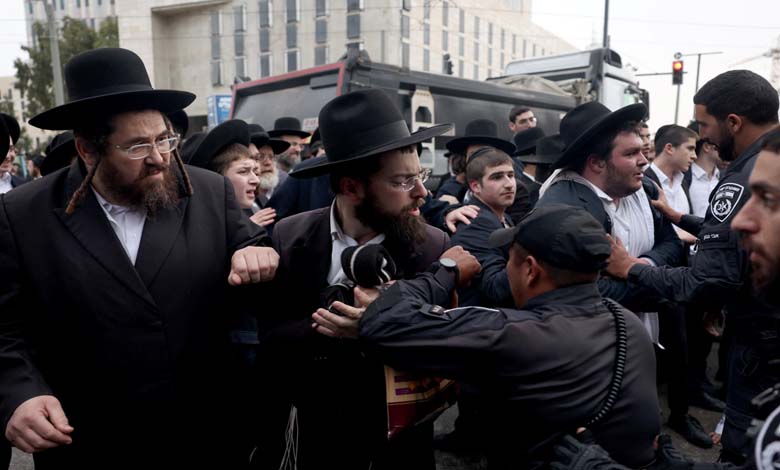New Failure for Netanyahu: Military Summons Drive “Haredim” to Protest

For the second consecutive day, clashes erupted between the Israeli police and dozens of Orthodox Jews, known as “Haredim,” who refuse to enlist in the Israeli army.
In recent days, the Israeli army issued over 1,200 military summonses to young Haredim, but only 30 of them responded. Meanwhile, hundreds of Haredim protested yesterday, Monday, near the recruitment center in Kiryat Ono, central Israel, where three of them were arrested.
Today, Tuesday, dozens of them returned to protest at the same location and clashed with Israeli police officers, who announced the arrest of seven individuals, labeling them as “troublemakers.”
Some Haredim were seen shouting “Nazis” at Israeli police officers on horseback, while others threw stones at the officers in an attempt to drive them away.
These scenes reflect the difficulties faced by the Israeli police in their first mission in decades to recruit religious Jews into the army.
Since 1948, the Haredim have been exempt from mandatory military service to devote themselves to studying the Torah. However, two months ago, the Israeli Supreme Court decided to mandate their military service and instructed the government to cut financial aid to religious schools whose students refuse military service.
This decision has sparked anger among the Haredim and religious leaders, who have called on their followers to ignore military summonses and tear them up if received.
The Haredim prevent army recruiters from delivering enlistment notices in neighborhoods and cities where they live in large numbers.
The Israeli army hoped that recruiting Haredim would be smooth and gradual, but it has proven to be fraught with difficulties.
The current coalition government, led by Benjamin Netanyahu, includes two ultra-Orthodox parties that view Haredim exemptions as a crucial factor in maintaining support from their voters in religious institutions and preventing these supporters from assimilating into the army, which could conflict with their conservative practices.
This issue has led to protests from the Haredim, who make up 13% of Israel’s population, with their proportion expected to rise to 19% by 2035.
The Haredim’s refusal to serve in the wars they support is becoming an increasingly contentious issue within Israeli society.
In March, Israel’s chief Sephardic rabbi, Yitzhak Yosef, threatened that Orthodox Jews would leave the country if forced to serve in the military, stating that the focus of yeshiva students on Torah study “provides protection to the army.”
In recent years, the influence of the Haredim in Israeli politics has grown, especially under the governments formed by Netanyahu.
The Haredim consider themselves partners of Netanyahu without closing the door to a potential alliance with Benny Gantz, the leader of the “Kachol Lavan” party, but they completely rule out an alliance with Yair Lapid, the leader of “Yesh Atid,” who also openly criticizes them.
Lapid often describes the Haredim as a burden on the state, as their students do not work and rely on government aid to fund their schools and institutions.
-
“Theft, Arson, and No Justification”.. Israeli Soldiers Refuse to Return to Gaza
-
Know Hezbollah’s “Primitive” Tactics in Confronting Israeli Technology
The Haredim have two parties represented in the Knesset and the current government: “Shas,” representing Sephardic Orthodox Jews, and “Yahadut Hatorah,” representing Ashkenazi Orthodox Jews.
In the last elections in 2022, “Shas” won 11 seats, while “Yahadut Hatorah” secured 7 seats out of the 120 in the Knesset.
Because Israeli prime ministers need their support to stay in power, their presence in any government often influences policies, including those related to the observance of Sabbath rituals.












